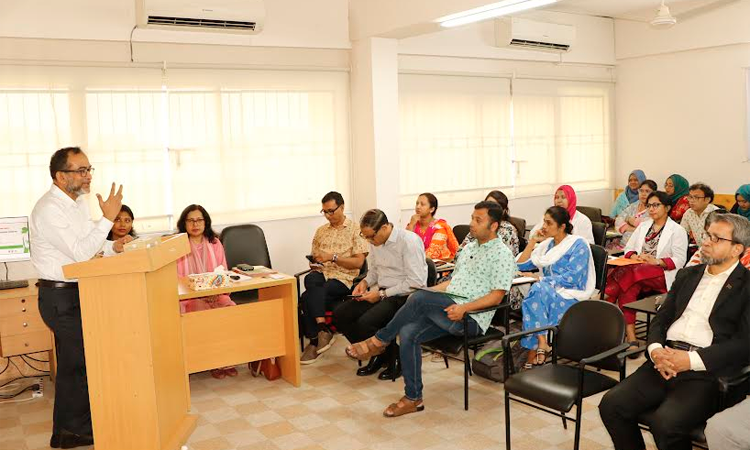News Flash

DHAKA, July 23, 2025 (BSS) — A recent study has found that every street-connected child surveyed has been subjected to physical, mental, and sexual abuse, with nearly all facing economic exploitation as well.
The findings were presented today by Associate Professor Dr. Hasan Reza of Indiana University at a seminar held at Bangladesh Medical University (BMU).
The research also revealed that 27 percent of the children do not know the whereabouts of their parents, and 97 percent come from extremely low-income families, according to a BMU press release.
Dr. Reza emphasized that the chronic trauma these children endure profoundly affects their development and future well-being. Without timely and effective intervention, he warned, their mental health may deteriorate severely.
The study, conducted nationwide by Global Street Connect, was themed “Adverse Childhood Experiences and its Health Impact.”
Besides, the seminar, organized by BMU’s Department of Public Health and Informatics, was titled “Vulnerability in Childhood and Vulnerable Children” in cooperation of the Open University (UK), Indiana University School of Social Work (USA) and Global Street Connect.
Professor Dr. Md. Atikul Haque presented the keynote on the impact of adverse childhood experiences. Atikul Haque, Chair of the Department of Public Health and Informatics also revealed the findings of a research study conducted by the department focusing on vulnerabilities in children, particularly on “Adverse Childhood Experiences and Their Impact on Health.”
Atikul Haque said that the research, conducted in classrooms at the Bangladesh Medical University’s Department of Public Health and Informatics, included 2,970 participants and explored the impact of Adverse Childhood Experiences (ACEs), and long-term non-communicable diseases (NCDs) and social issues in later life.
The results showed that individuals who experienced mental, physical, or sexual abuse in childhood or were exposed to neglect, family conflict, substance abuse, parental separation, or incarceration of a family member— faced significantly higher health risks and social complications in adulthood.
The impact of these adverse childhood experiences was found to be not only physical, but also deeply psychological and social.
According to the study, individuals with an ACE score of 4 or more had twice the likelihood of developing Type 2 diabetes compared to others.
Similarly, mothers with more than three ACEs in their personal history had a four times higher risk of giving birth to a child with a neurodevelopmental disorder (NDD). The risk of developing heart disease also increased significantly with a higher number of ACEs.
People who had experienced ACEs in childhood also showed markedly higher levels of depression, anxiety, and stress, indicating a strong correlation.
Furthermore, having a history of ACEs in childhood was linked to an increased risk of experiencing intimate partner violence later in life. The likelihood of suffering from physical and mental abuse in old age also rose significantly among those with ACE exposure.
Although a connection between sexual abuse and ACEs was found, it was not statistically strong. However, ACEs were also shown to have an influence on economic abuse, though the relationship was relatively weaker.
The most important message from these studies is that a safe and violence-free childhood environment is not only crucial for immediate well-being but forms the foundation for an individual’s lifelong health, emotional stability, and social relationships.
A lack of love, security, and care in a child’s life can have deep and lasting effects on their future, mentioned the report, saying that therefore, it is essential to implement effective measures across all levels of society—including families, schools, the healthcare system, and policy-making bodies—to prevent violence and neglect during childhood.
Dr. Sharif Haider, Mental Health Clinician and Faculty Member at The Open University said, “Mental health is not a secondary issue; it is central to child protection.”
He added, “Research shows that the more Adverse Childhood Experiences (ACEs) a child faces, the higher the risk to their mental health. Violence leaves invisible scars on every child’s mind, which they carry throughout their lives.”
Speaking at the event as chief guest, BMU Vice-Chancellor Professor Dr. Md. Shahinul Alam said that research and multifaceted initiatives addressing childhood adversities and their health implications play a crucial role in ensuring children’s well-being and a safe, healthy future. It is essential to ensure that children do not face violence, neglect, or abuse – whether at home, in society, or in educational institutions, he added.
BMU Pro-Vice Chancellor Professor Dr. Md. Mujibur Rahman Hawlader in his speech as chair said that in a male-dominated society, women’s health is often neglected, and girl children are especially subjected to neglect and abuse.
Many children suffer from trauma and mental illness due to various forms of abuse and psychological stress at home, in society, and even in educational settings, he said, adding, universities can play a major role in overcoming this situation.
This seminar was part of the national-level campaign “Break the Cycle – Stop Violence Against Street Children,” led by Global Street Connect. The initiative aims to ensure child protection and drive constructive changes in policymaking.